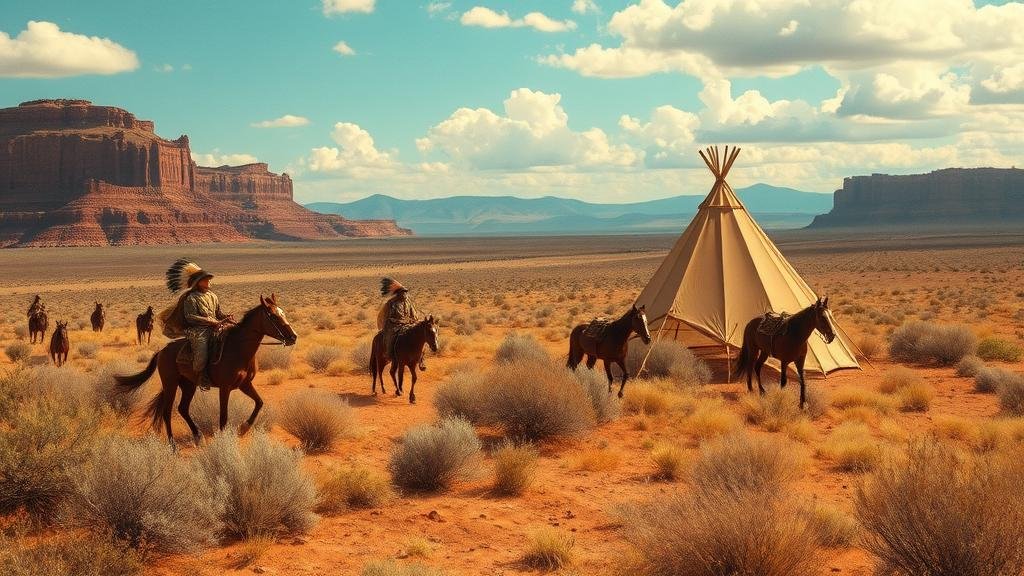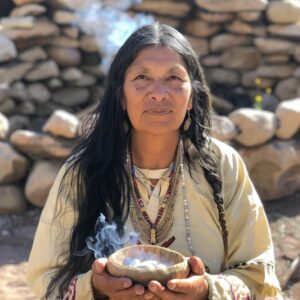The Role of the Apache in the Mexican-American War A Lesser-Known Chapter of History
Introduction
The sun set over the rugged landscapes of the Southwest, casting long shadows across the land where the Apache traveled. As the embers of conflict glowed, the Mexican-American War ignited a series of events that would intertwine the destinies of many peoples. Amidst the struggle for territory and sovereignty, the Apache emerged as both allies and adversaries, revealing a complex role often overshadowed in history books. R involvement is a testament to their adaptability, resilience, and deep connection to the land.
While historical narratives often focus on larger military campaigns and well-known figures, the contributions of the Apache offer a unique perspective. They were not mere spectators; rather, they played crucial roles in shaping the outcomes of various skirmishes, often influenced by their traditional wisdom and strategies. In many ways, the Apache response to the conflict mirrored their storied past, characterized by a fierce commitment to home and heritage.
This article delves into the lesser-known chapter of the Apaches’ involvement in the Mexican-American War. By examining their actions, motivations, and alliances, we unveil a rich tapestry woven with courage, skill, and survival instinct. Their story is one of honor and resistance, resonating with the lessons of unity and strength that continue to inspire today.
Through Apache wisdom, we learn that history is not merely a sequence of events, but a living narrative shaped by the voices of those who endure. As we navigate this chapter, we honor the enduring spirit of the Apache and their profound impact on the course of a pivotal moment in American history.
Historical Context
In the early 19th century, the American Southwest was a melting pot of cultures, with the Apache people residing in the region long before European settlers arrived. Their rich traditions and deep connection to the land shaped their identity and resilience. The Mexican-American War, which lasted from 1846 to 1848, emerged in a context of territorial disputes and national ambitions, significantly affecting indigenous communities like the Apache.
The war ignited tensions as the United States sought to expand its territory, fueled by the doctrine of Manifest Destiny. This ideology justified the annexation of vast Mexican lands, often at the expense of native populations. The Apache, already marginalized by encroaching settlers, found themselves in a precarious position, navigating the tumultuous landscape of allegiance and survival.
Apache leaders and warriors faced extraordinary challenges as they braced for shifting powers. Some groups allied with the Mexican government, seeking protection against American encroachment, while others resisted actively to preserve their sovereignty. This division highlighted the complexities of their situation during a time when survival depended on strategic choices amidst rapid political changes.
Despite their efforts, the outcomes of the war significantly altered the Apaches way of life. With the Treaty of Guadalupe Hidalgo in 1848, the United States gained control over present-day California, Nevada, and Utah, as well as parts of Arizona, New Mexico, Colorado, and Wyoming. Consequently, the Apaches ancestral lands were further threatened, leading to a series of conflicts and negotiations as they struggled to maintain their cultural identity.
In this forgotten chapter of history, the Apache played a crucial role as both warriors and negotiators. R understanding of the land and its ecosystem was intertwined with their resistance strategies. As they faced an uncertain future, their wisdom and resilience became vital tools in navigating this transformative period.
Apache Contributions Mexican-American War
An Apache Story
In the heart of the Southwest, the Apache people have long held a profound connection to the land and its history. Their wisdom teaches resilience and adaptability, qualities that shone brightly during the tumultuous time of the Mexican-American War. As external conflicts unfolded, the Apache navigated their own path, engaging in a struggle for survival and sovereignty.
The Apaches, known for their fierce spirit, were not mere sidelines in this conflict; they played a pivotal role. R deep understanding of the terrain, combined with strategic guerrilla warfare, transformed them into formidable opponents. As they maneuvered through the shadows of the mountains and deserts, they implemented tactics that disrupted the plans of both Mexican and American forces.
Through these experiences, the Apache reaffirmed their commitment to unity and strength. They rallied together, drawing from their communal bonds to face the challenges imposed upon them. With each encounter, their bravery became a testament to their enduring spirit, echoing the wisdom passed down through generations.
From this tumultuous chapter, invaluable lessons emerge. The Apache embraced their identity while standing firm against external forces. Their courage and cunning during the Mexican-American War remind us of the unyielding strength that springs from a deep-rooted sense of belonging and purpose.
In the midst of chaos, we find our true selves.
The legacy of the Apache in this conflict transcends borders and time. It serves as a reminder that history often shifts beneath the surface, revealing hidden stories of strength, resilience, and undying spirit. As the pages of history turn, the Apache narrative continues to inspire, grounded in the wisdom of their ancestors.
In the heart of the Apache lands, under the expansive sky painted with hues of orange and purple at dusk, the wise elder Ishtar gathered the youth around the flickering flames of a campfire. The crackling sound of the fire intertwined with the whispers of the night, creating an atmosphere ripe for stories. Listen closely, my children, Ishtar began, his deep voice resonating harmoniously with the soft rustling of the nearby mesquite trees. Tonight, I share a tale of courage during a time long past, when our ancestors stood at the crossroads of war.
Kalevala, eager and wide-eyed, leaned forward. Tell us of our people, Ishtar! He implored, a flicker of excitement dancing in his gaze. Ishtar nodded, recalling the tumultuous events of the Mexican-American War. Our Apache brothers and sisters, struggling under the weight of conflict, witnessed the clash between two worlds, he explained. Some of our brave warriors chose to ally with the Mexican forces, seeing a chance to protect their lands, while others sought the path of independence. In the midst of this turmoil, Way, a young warrior known for his sharp mind and swift feet, rose to unite our people.
As the wind whispered through the trees, brushing against their skin, Ishtar continued, Way journeyed across the desert, gathering allies with a heart full of courage. He spoke with fervor, Our strength lies not just in the fight, but in our unity. Together, we can shape our destiny. His words ignited a fire within the hearts of many, inspiring them to stand together against forces that threatened their home. And in that fierce moment, they remembered the Apache way–protection of the land and each other, a value taught through generations.
With the stars now twinkling as witness, Ishtar voice took on a reflective tone. Yet, in all battles, my children, the choice to fight or to flee must stem from the wisdom of the heart. Many sacrificed, and many dreamed of peace. Way understood this deeply: We seek not only survival, but harmony with our surroundings and with each other. And as they surged into the fray, their spirit echoed our ancestors lessons of resilience and hope.
As the story reached its crescendo, the flames flickered with intensity, illuminating the faces of the eager listeners. Ishtar paused, his gaze sweeping over the group. Remember this lesson: In times of struggle, let unity be our weapon and wisdom our shield. The world may try to divide us, but as long as our roots are anchored in love for our land and each other, we shall endure. The fire crackled softly, and the night air held the promise of tomorrow, as the stars above shimmered in silent agreement.
Practical Applications
Implementing the Principles of The Role of the Apache in the Mexican-American War
The Apache played a pivotal role in the Mexican-American War, often overlooked in mainstream narratives. Integrating their principles into daily life involves embracing resilience, community support, and a strong sense of identity. Here show you can do it.
Practical Steps to Incorporate Apache Principles
- Learn about Apache History: Dive into resources such as books, documentaries, or local history museums. Understanding the history helps you appreciate the resilience and strategic wisdom of the Apache people.
- Build Community Connections: Engage with your neighbors and local community organizations. Like the Apache, who valued strong social ties, creating a circle of support can lead to a more fulfilling life.
- Practice Resilience: When faced with challenges, adopt an Apache mindset by looking for solutions rather than dwelling on obstacles. This could mean reframing a setback as an opportunity for growth.
- Embrace Cultural Traditions: Incorporate elements of Apache culture, such as storytelling or music, into your daily routine. This not only enriches your life but also honors the legacy of the Apache.
- Foster Teamwork: Whether in your workplace or community projects, prioritize collaboration. The Apache often worked together strategically, which led to successful outcomes.
- Reflect on Personal Identity: Take time to understand what defines you. The Apache had a strong sense of self; fostering your own identity can lead to greater confidence and purpose.
- Engage in Outdoor Activities: The Apache were deeply connected to nature. Spending time outdoors can enhance your well-being and provide a channel for personal reflection.
Potential Challenges and How to Overcome Them
Adopting these principles may come with its difficulties. For instance, learning about history may feel overwhelming at first. To overcome it, start with small, digestible resources, like articles or short videos.
Another challenge could be fostering community connections in a fast-paced digital age. Combat this by attending local events or joining clubs that interest you. Personal interactions can help bridge the gap caused by technology.
Tips for Maintaining Consistency
To keep these principles alive in daily life, set achievable goals. You might designate one day a week to explore Apache culture or volunteer in your community. Consistency is key, so creating a schedule can help.
Also, consider finding a buddy who shares your interests. Having someone to embark on this journey with can elevate your commitment and ensure you stay accountable to your goals.
How will you begin your journey of integrating these Apache principles into your life? Explore the history and find ways to make meaningful connections; your experience will flourish with every step you take.
Apache Contributions Mexican-American War
Conclusion
To sum up, the Apache played a crucial yet often overlooked role in the Mexican-American War, navigating complex alliances and conflicts with both Mexican and American forces. Their strategic acumen and fierce resistance demonstrated their unwavering commitment to protecting their homeland and way of life. This chapter of history reveals not just the resilience of the Apache people but also their significant contributions to shaping the western frontier.
Understanding this lesser-known narrative enriches our appreciation for Native American history and their enduring spirit. It reminds us that the stories of indigenous peoples are woven into the fabric of American history, often waiting to be uncovered and recognized. Knowledge of their involvement in the war can foster deeper connections and respect between cultures.
We encourage readers to delve further into the history of the Apache and other Native American tribes during this era. Explore books, documentaries, and educational resources that illuminate their experiences and perspectives. By advocating for awareness and acknowledgment, we honor their legacy and enrich our understanding of the past.
To know the past is to understand the present; to understand the present is to prepare for the future. – Apache proverb
More Resources
Dive deeper into the fascinating world of Apache wisdom and its modern applications. Explore these thought-provoking questions to expand your understanding of the concepts discussed in this article.
Explore Further with Google
- How can we explore spiritual teachings in our community development?
- How can we integrate cultural heritage in our climate change?
- How can we pass down earth-based spirituality in our sustainable agriculture?
Discover Insights with Perplexity
- How can traditional ecological knowledge inform modern conservation efforts?
- What ancient healing practices are being rediscovered by modern medicine?
- How do ancestral teachings contribute to personal growth?
By exploring these questions, you’ll gain a richer appreciation for indigenous cultures, environmental stewardship, and mindfulness practices. Each link opens a gateway to deeper knowledge, helping you connect ancient wisdom with contemporary life.
Thank you for reading!







